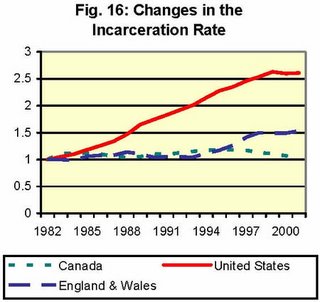Felon Disenfranchisement in America

I have recently done some research on felon disenfranchisement and thought I would post some sources of information here for those interested. Felon disenfranchisement is a very interesting topic from a human rights standpoint for multiple reasons. One of the most striking are the examples are of various states taking away the right to vote of ex-felons who have served their entire sentence. Another important factor to look at is race as the following is an excerpt from a paper I wrote about this topic last year:
...in Alabama and Florida, 31 percent of all black men are permanently disenfranchised. In five states (Iowa, Mississippi, New Mexico, Virginia, and Wyoming) one in four black men are permanently disenfranchised. In Delaware and Texas, approximately one in five black men are currently disenfranchised. In 13 other states, between 10 to 18 percent of black men are currently disenfranchised. According to a recent Human Rights Watch report, if current rates of incarceration continue, 28.5 percent of black men will be confined to prison at least once during their lifetime, six times greater than that for white 13 men. If this estimation is correct, the majority of these prisoners will be disenfranchised for part or all of their lives.
The main source that I have looked at on the topic is the homepage of Christopher Uggen a professor at the University of Minnesota. On his website he has information about how each state chooses to disenfranchise felons forever, those who are on probation, parole, etc. Also, you can find information about how the American public feels on the issue. Definitely read his article entitled, "Punishment and Democracy: The Disenfranchisement of Nonincarcerated Felons in the United States" co-written with Jeff Manza. He also has a blog, which can be accessed by clicking here.
Another great source of information comes from the Sentencing Project a non-profit devoted to reducing the incarceration rate in America. Other non-profits and sources on the subject are pasted below:
Prison Policy Initiative
Report by Human Rigths Watch: "Losing the Vote: The Impact of Felony Disenfranchisement Laws in the United States"
Another more recent Human Rights Watch Report
International Center for Prison Studies (King's College London)
BBC News Article on the topic
If anyone has additional information on the topic, please send me an email or post in the comments section. Also, let me know your thoughts on felon disenfranchisement and whether the practice is just or not.
--Tom Hayes



2 Comments:
You're right that it is currently constitutionally permisable, but that doesn't mean it has to stay that way. It is possible (though not probable) that an amendment could be passed that does not allow any restrictions on voting (felon or non-felon). However, what is likely to be more successful in the immediate future is for each state to change their laws either through the legislature. Individual citizens could also pass laws by ballot initiative, such as in Colorado. But I think you are correct in arguing that for change to come it must be from the state legislatures.
Denying the right to vote to ex-felons seems to me to be an extremely unjust practice (this occurs in 14 states), and most of the American public agrees as can be seen from some of the sources I provided.
Some lowlife felon has an atitude problem? Who cares?
Post a Comment
<< Home